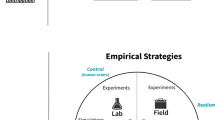Abstract
XP is a social activity as well as a technical activity. The social side of XP is emphasized typically in the values and principles which underlie the technical practices. However, the fieldwork studies we have carried out with mature XP teams have shown that the technical practices themselves are also intensely social: they have social dimensions that arise from and have consequences for the XP approach. In this paper, we report on elements of XP practice that show the social side of several XP practices, including test-first development, simple design, refactoring and on-site customer. We also illustrate the social side of the practices in combination through a thematic view of progress.
Preview
Unable to display preview. Download preview PDF.
Similar content being viewed by others
References
Beck, K., Andres, C.: Extreme Programming Explained: embrace change. Addison- Wesley, San Francisco (2005)
Robinson, H.M., Sharp, H.: XP culture: why the twelve practices both are and are not the most significant thing. In: Proceedings of the Agile Development Conference Salt Lake City, Utah, June 25-28, pp. 12–21. IEEE Computer Society Press, Los Alamitos (2003)
Robinson, H.M., Sharp, H.: The characteristics of XP teams. In: Eckstein, J., Baumeister, H. (eds.) XP 2004. LNCS, vol. 3092, pp. 135–147. Springer, Heidelberg (2004)
Beck, K.: EXtreme Programming Explained: embrace change. Addison-Wesley, San Francisco (2000)
Robinson, H.M., Segal, J., Sharp, H.: The case for empirical studies of the practice of software development. In: Jedlitschka, A., Ciolkowski, M. (eds.) Proceedings of the ESEIW Workshop on Empirical Studies in Software Engineering. Rome Castles, Italy, September 29, pp. 98–107 (2003)
Sharp, H., Robinson, H.M.: An ethnographic study of XP practice. Empirical Software Engineering 9(4), 353–375 (2004)
Sim, S.E.: Evaluating the evidence: lessons from ethnography. In: Proceedings of the Workshop on Empirical Studies of Software Maintenance, Oxford, England, pp. 66–70 (1999)
Heath, C., Luff, P.: Collaboration and control: crisis management and multimedia technology in London Underground line control rooms. In: Proceedings of CSCW 1992, pp. 69–94 (1992)
Mackinnon, T.: XP - call in the social workers. In: Marchesi, M., Succi, G. (eds.) XP 2003. LNCS, vol. 2675, pp. 288–297. Springer, Heidelberg (2003)
Suchman, L.A.: Plans and Situated Actions. Cambridge University Press, Cambridge (1987)
Martin, A., Noble, J., Biddle, R.: Being Jane Malkovitch: a look into the world of an XP customer. In: Marchesi, M., Succi, G. (eds.) XP 2003. LNCS, vol. 2675, Springer, Heidelberg (2003)
Martin, A., Biddle, R., Noble, J.: The XP customer role in practice: three case studies. In: Proceedings of the Second Agile Development Conference. Salt Lake City, Utah, June 22-26 (2004)
Sharp, H., Robinson, H.M., Segal, J.: EXtreme Programming and User-Centered Design: friend or foe? In: Proceedings of HCI 2004. Leeds (2004)
Davis, H.: The social management of computing artefacts in nursing work: an ethnographic account. PhD thesis, University of Sheffield, pp. 289 (2001)
Author information
Authors and Affiliations
Editor information
Editors and Affiliations
Rights and permissions
Copyright information
© 2005 Springer-Verlag Berlin Heidelberg
About this paper
Cite this paper
Robinson, H., Sharp, H. (2005). The Social Side of Technical Practices. In: Baumeister, H., Marchesi, M., Holcombe, M. (eds) Extreme Programming and Agile Processes in Software Engineering. XP 2005. Lecture Notes in Computer Science, vol 3556. Springer, Berlin, Heidelberg. https://doi.org/10.1007/11499053_12
Download citation
DOI: https://doi.org/10.1007/11499053_12
Publisher Name: Springer, Berlin, Heidelberg
Print ISBN: 978-3-540-26277-0
Online ISBN: 978-3-540-31487-5
eBook Packages: Computer ScienceComputer Science (R0)




